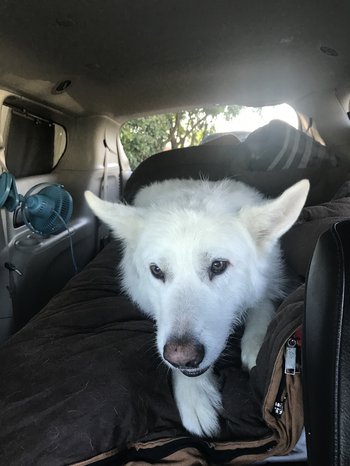Remember the Tritons
By Jay Stoeckl, Chief Assistant to the Assistant, Assistant Breeder, June 11, 2024
Raise a puppy.
Train a dog.
Get attached to dog.
Rehome the dog.
Often the question arises: “Jay, how can you give up a dog?”
The answer to this question is simple…
I have NO IDEA.
Triton was among the best dogs we’ve had from birth to adult as Jennifer assigned him from the very start to be a service dog for DireWolf Guardians.
Nearly every trip I have to say goodbye to an adult dog.
Most recently, that dog was Dreamer.
It was heartbreaking to experience her leaning up to me, telling me she loves me more than all others, then watch me leave her forever.
The hardest part is feeling as if I am abandoning them.
They look at me as I walk away, their shiny brown eyes imploring me for answers.
It IS heartbreaking and many times I drive away feeling warm tears in my eyes.
But then, there are the reunions.
As all of you know, Jennifer requested I stop in Texas to help assess the Triton dilemma. An invitation to see a dog I once had to say goodbye to has just the opposite effect on me. I feel that Christmas morning anticipation when I reach their town, wondering how the dog will act once it recognizes me.
And Triton certainly did recognize me.
Not at first, mind you!
He kept his distance until I gave him a chance to realize who I was.
After all, no one sent Triton a heads up I was coming!
Then my scent caught his olfactory receptors—all 250,000 or them.
He then walked right up to me.
It was not the Tigger bouncy-trouncy reaction, but he did dance enough for his front feet to leave the ground a few times.
And when I sat down, Triton buried his head into my knees as I kissed him on the head.
I LOVE HAPPY REUNIONS!
As Jennifer described yesterday, I stayed overnight to assess the situation.
I walked Triton twice to get a feel for his physical stability.
On both occasions, I finished up the walk with an invitation into my Pacifica.
On the second try, I gave him no choice.
AND he jumped up on my camping cot on his own—not the sign of a dog with hip or back issues.
And so we went for about a 25-minute drive around the town.
As you can tell in the photo above, Triton is not in distress. He layed his head down even and let me reach over my shoulder to pet him during the drive.
What a wonderful dog!
The natural next step was to assess him in his owner’s truck.
It was NOT easy at all lifting a scared 130 lb. dog!
And from the moment he jumped up, he was apprehensive.
It became evident that Triton had extreme anxiety right from the start. I suspected immediately the truck may have been the issue. And because it was an older truck with a bouncy, rickety character, I thought that the rough ride had everything to do with Triton’s apprehensiveness.
He was clearly not comfortable. He panted so much the side of my pants was soaked through. And every time his master hit the brakes, even a little, Triton buried his head in the crook of my arm.
And you know the rest.
Some time ago, I experienced another dog who had been in a car accident.
It did not easily recover.
The difference between a dog and a human when emergencies happen, is that humans have an ability to communicate what occurs in a traumatic event in order to gain understanding.
And understanding becomes the first step in recovery.
But a dog never finds that understanding.
There are no words to aide in the healing.
Imagine a five-year-old getting on an elevator. The elevator suddenly loses its cable and falls three floors before the emergency brakes force it to a halt. The child, though not physically harmed, has been thrown to the elevator floor without control.
The child experiences a trauma, but cannot fully comprehend what happened. All the child knows is he never… EVER… wants to get onto an elevator again. It could take the child years to get past his fear.
Jennifer and I have been talking about what to do about Triton’s situation and working with his owner about rehabilitation. If Triton cannot ride in a vehicle, he won’t be able to perform the tasks he was trained to do out in public.
This is quite a dilemma.
It leaves us with only two options.
- We can either find a trainer to retrain him—preferably in a different vehicle (he was fine in my Pacifica).
- Or we would have to retire Triton and train a whole other dog, which would take years.
(No one likes the second option.)
That is why we opted for a local trainer in Triton’s community who can help Triton overcome his anxiety.
And Triton’s family is working on resolving the vehicle challenge.
You can help us fund Triton’s specialized training by donating to hire someone locally to work with Triton.
Jennifer Stoeckl is the co-founder of the Dire Wolf Project, founder of the DireWolf Guardians American Dirus Dog Training Program, and owner/operator of DireWolf Dogs of Vallecito. She lives in the beautiful inland northwest among the Ponderosa pine forests with her pack of American Dirus dogs.